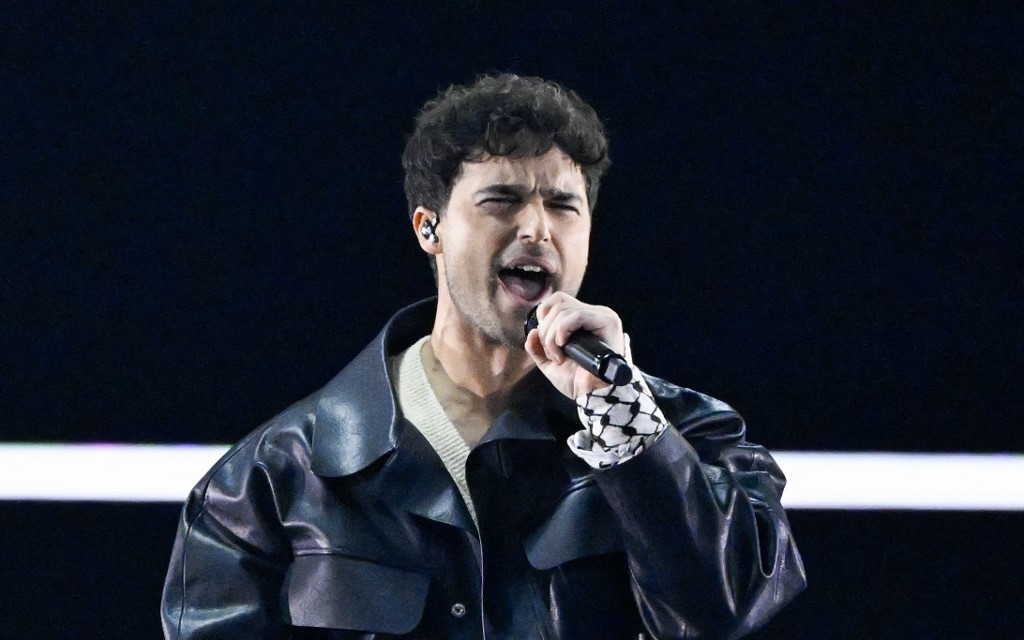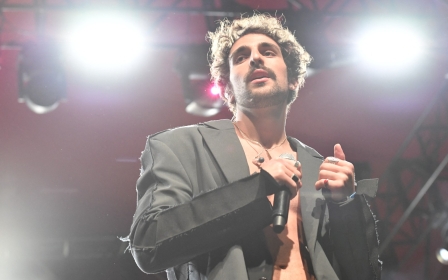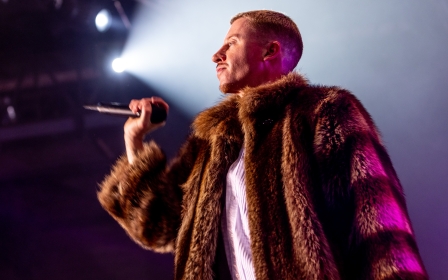Eurovision 2024: Outrage after Swedish-Palestinian artist rebuked for wearing Palestinian scarf

The Eurovision song contest is facing intense scrunity and accusations of discrimination after it rebuked Swedish-Palestinian pop star Eric Saade for wearing a Palestinian scarf in the opening act of the semi-finals.
Saade, whose father is of Palestinian origin, kicked off the first semi-final of the Eurovision Song Contest in Malmo, Sweden on Tuesday evening with a keffiyeh, a traditional Palestinian and Arab male headdress, wrapped around his wrist.
The scarf has increased in popularity since last year, and is used by many demonstrators and activists to display their support for Palestinians amid Israel's war on the Gaza Strip.
In response, the organisers of the contest, European Broadcasting Union (EBU) released a statement saying it "regretted" that Saade wore the scarf.
New MEE newsletter: Jerusalem Dispatch
Sign up to get the latest insights and analysis on Israel-Palestine, alongside Turkey Unpacked and other MEE newsletters
Several people took to social media to point out that the black and white chequered scarf is a part of Palestinian cultural heritage and questioned the EBU’s framing of it as a political symbol.
"Eric Saade getting dragged because he is wearing a piece of clothing which is literally PART of HIS OWN heritage, when everyone else is allowed to wear whatever traditional clothing they want," commented one social media user.
Another shared: "Eric Saade is palestinian. The keffiyeh is a symbol of palestinian culture. He didn’t say or do anything political here… you know what is political? Promoting the entry of a genocidal country."
Eurovision later posted clips of the performances of the other two opening acts on its social media pages, but did not share Saade’s, prompting social media users to share the performance on their personal pages to show support for the artist.
#EricSaade wore a kuffiyeh around his wrist at #Eurovision and the level of hate directed at him now is insane!
— Bea (@HerNameIs_Bea) May 8, 2024
This world in a nutshell: Israel can murder 40,000 Palestinians, and yet being allowed to whitewash its crimes.
But, oppose genocide and you're attacked!
Eric 👏👏 pic.twitter.com/FqlMlmkH0b
Responding to the EBU through a story on his personal Instagram account, the pop star explained that the keffiyeh was a gift from his father, a way to remember his roots, and criticised Eurovision’s ban of Palestinian flags and symbols.
"I didn't know that one day it would be called a 'political symbol'. It's like calling a Dala horse [a traditional Swedish horse statue] a political symbol," the singer who represented Sweden in the 2011 iteration of the competition wrote.
"In my eyes, it's just racism. I just wanted to be inclusive and wear something which is real to me, but the EBU seems to think that my ethnicity is controversial.
"It says nothing about me, but everything about them."
Protest and performance
The 2024 edition of the European song contest has been mired in controversy due to Israel's participation as it continues its military assault on the Gaza Strip, which has left over 34,700 Palestinians dead, the vast majority civilians.
Thousands more are under the rubble, believed to be dead.
There have been calls to boycott the contest and numerous protests against Israel’s participation from fans and artists alike.
Earlier this year, over 1,400 Finnish artists signed a petition demanding Israel's suspension from the contest, accusing the state of war crimes in Gaza.
Similar calls were made by Swedish and Icelandic musicians to boycott the competition unless Israel was suspended.
Well done to Swedish-Palestinian singer Eric Saade who wore a keffiyeh around his wrist at Eurovision semi-final yesterday. Eurovision kicked out Russia but refuses to kick out Israel, and now demonise Saade simply for wearing a keffiyeh. Solidarity with Saade and boycott Israel! pic.twitter.com/gQaWpKZM1g
— Lukas Slothuus (@lslothuus) May 8, 2024
Critics say that their demand that Israel be barred from the competition are not unprecedented, pointing out that Russia was disallowed by Eurovision just two years ago because of its war on Ukraine.
"Eurovision has rebuked Swedish-Palestinian singer Eric Saade for wearing a kefiyyeh, claiming that its contest is 'non-political'," posted another user.
"In 2022, the 'non-political' Eurovision banned Russia from the contest due to its invasion of Ukraine," they added.
Eden Golan, the singer representing Israel, will perform in the second semi-finals on Thursday, 9 May in a performance under heavy security.
The winners of the semi-finals will go through to the final on Saturday, which will be watched by up to 150 million people worldwide.
This article is available in French on Middle East Eye French edition.
Middle East Eye delivers independent and unrivalled coverage and analysis of the Middle East, North Africa and beyond. To learn more about republishing this content and the associated fees, please fill out this form. More about MEE can be found here.




